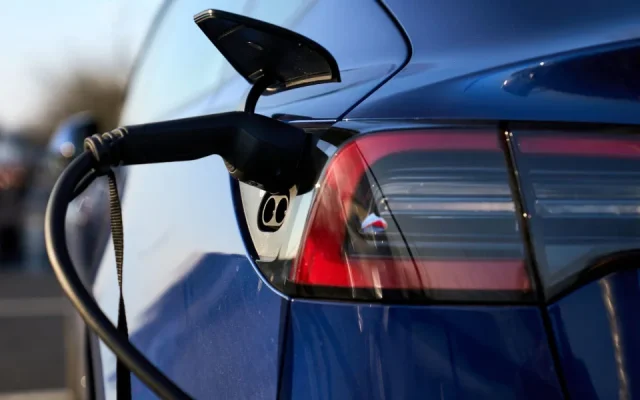[ad_1]
DETROIT – Falling electric vehicle (EV) prices are leaving a growing number of drivers in negative equity, a top dealership chain has warned.
Vertu Motors said on Wednesday that car retailers were coming under pressure as EVs coming off financing agreements were found to be worth less than the loan they are attached to.
In most car finance deals, this is not a problem for drivers as – provided they have kept up with their payments – they can hand back the keys and walk away.
The lender that funded the leasing deal then typically takes the financial hit.
However, the issue creates a headache for dealers that often allow customers to “roll over” positive or negative equity into new financing deals to win repeat business.
The steep drop in electric cars’ value is being partly fuelled by the discounts offered on new vehicles, as manufacturers attempt to boost sales to hit legally-binding government targets.
Rob Forrester, Vertu’s chief executive, said: “We all know that battery electric vehicles have depreciated at a significant rate, and that tends to feed into the creation of negative equity.
“If you think about when many cars were bought two to three years ago, new car prices were quite high because of supply constraints, but since then there’s been a reduction in used car value.”
It follows warnings last month that so-called fleet operators, such as car leasing firms and rental companies, were having to swallow large losses when reselling EVs because of “accelerated, exceptional depreciation”.
In the past two years, the British Vehicle Rental and Leasing Association (BVRLA) said the average amount of “residual value” left over at the end of a car’s lease period had plunged from 60pc to 35pc.

That means a car worth £50,000 when new would drop to £17,500 in value over three years – instead of £30,000.
Car leasing agreements tend to last two to three years, with monthly payments generally agreed to cover the vehicle’s predicted depreciation over that period – minus a deposit.
However, the vast majority of these deals are personal contract purchase (PCP) deals where the lender agrees to a “guaranteed minimum future value” at the end of the deal, also sometimes known as a balloon payment.
Consumers can typically hand the car back and walk away if the car’s estimated worth drops below the minimum guaranteed value.
But many dealerships allow them to add the value of negative equity to a new financing deal, or take positive equity off the price of their next car if it is in surplus, in a bid to retain customers.
Read more at Yahoo Finance
[ad_2]
Source link











